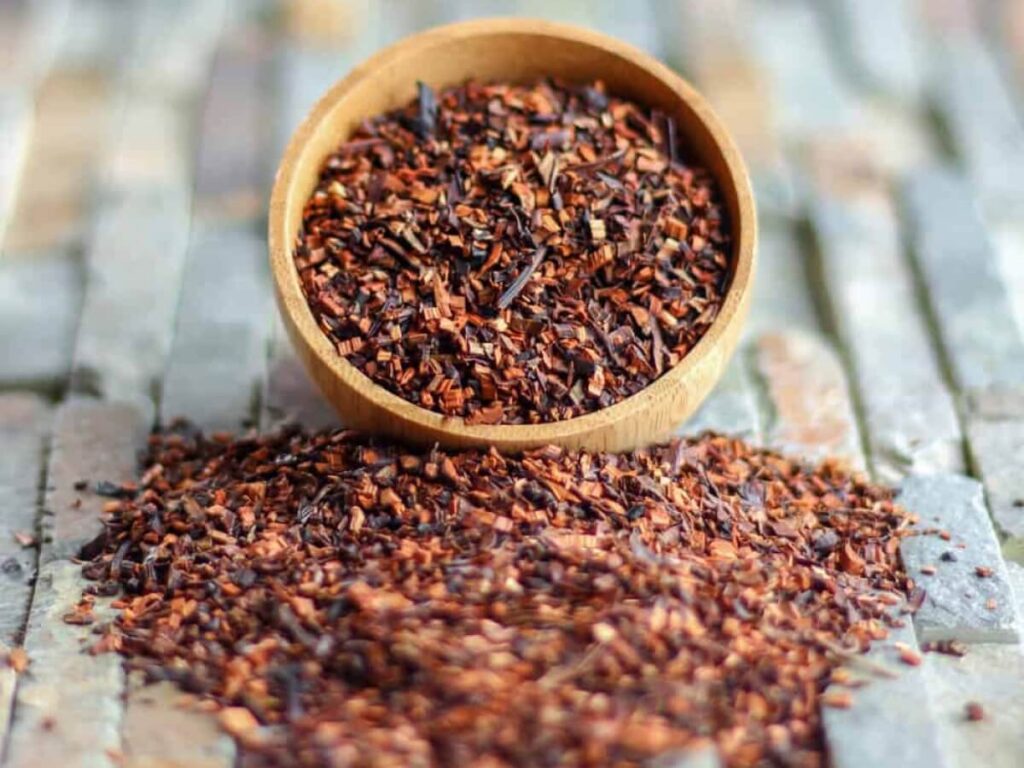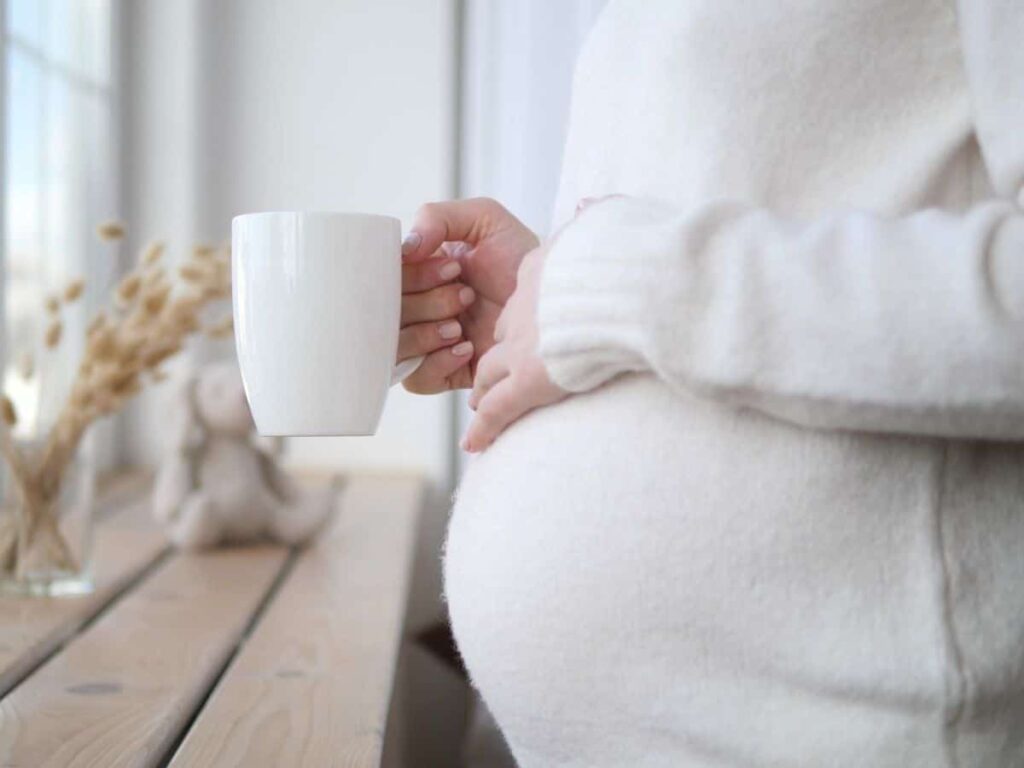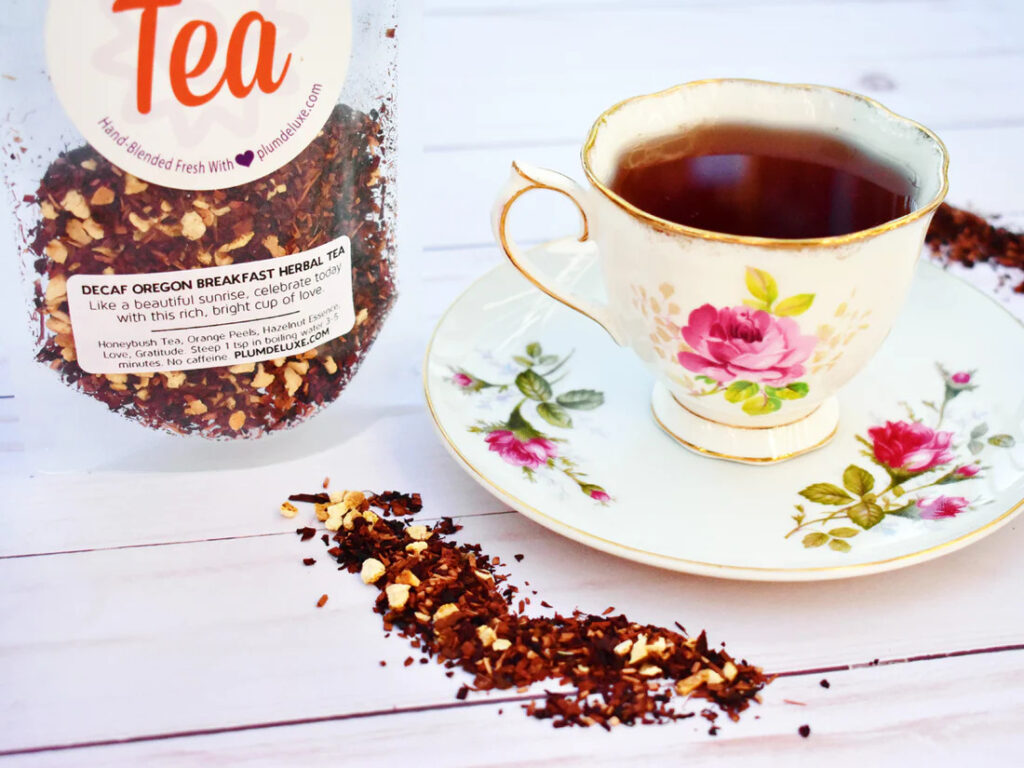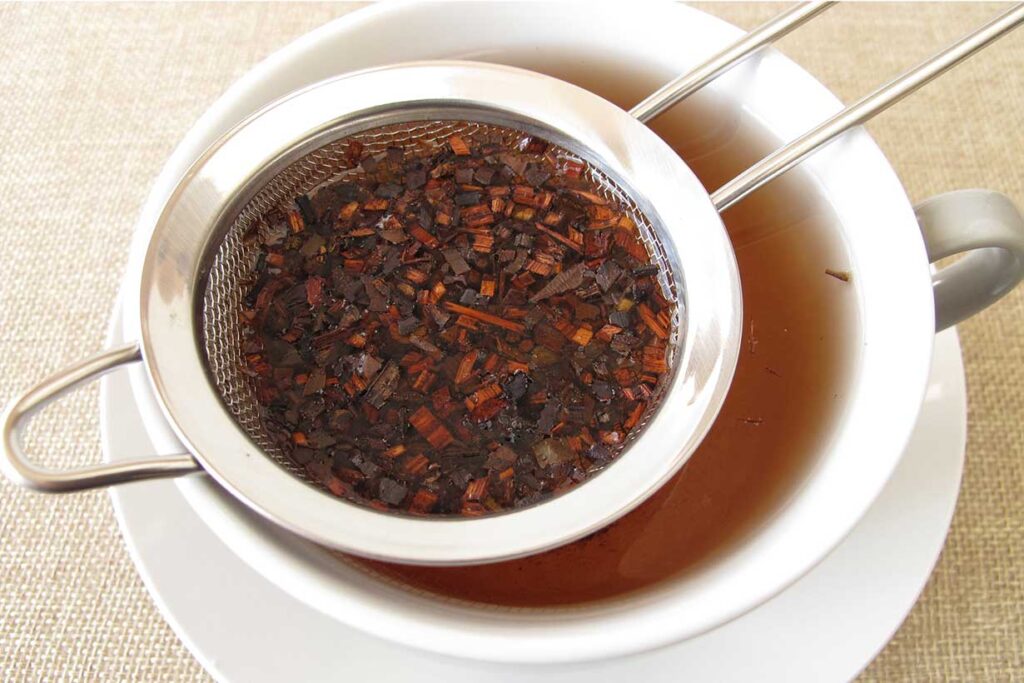Many women recommend having honeybush tea during pregnancy to boost immunity and to get a good night’s sleep. Honeybush has a mild flavor and provides nourishment to your growing body.
Etymology
Honeybush, or cyclopia is a flowering plant indigenous to South Africa. It is a plant with yellow flowers that give off the scent of honey, thus the leaves are called honeybush. Leaves are the most widely used part of the cyclopia plant and the most common way to use it is to make honeybush tea.
What Is Honeybush Tea?
Honeybush tea is tea made from the leaves of the cyclopia plant. Being a native plant of South Africa, it is widely consumed in that region and most people also refer to it as ‘mountain tea’. The undertones of the taste of honeybush tea are floral, roasted, and like honey.

It tastes similar to rooibos tea although it is slightly sweeter than that. Just like rooibos tea, honeybush tea is also considered a red tea. It has great medicinal benefits and is used as a herbal remedy for various purposes. However, the benefits of rooibos tea far exceed those of honeybush tea.
It is naturally free of caffeine and so honeybush tea is an excellent organic pregnancy tea for your pregnancy journey.
Significance of Honeybush Tea in Pregnancy
There has been an increase in the consumption of honeybush tea during pregnancy by women, as an alternative to caffeinated drinks such as tea or coffee. There is not a lot of research on the significance of honeybush tea, but limited research suggests that it is safe to consume during pregnancy.
There are several benefits that honeybush tea has to offer.

Benefits
- Full of antioxidants – Honeybush tea is packed with antioxidants and that makes it an excellent choice for you during pregnancy, apart from having an impact on your overall health, it is excellent for your skin.
- Naturally caffeine-free – It is an organic tea and has no caffeine in it naturally, and that is what makes it healthy for consumption as too much caffeine can be dangerous for you during pregnancy.
- Antidiabetic properties – There is not a lot of evidence but the limited research suggests that the polyphenols present help combat type 2 diabetes and this can be useful in pregnancy.
- Low tannin levels – Honeybush has minimal tannin levels which is a plus point as tannin (which is present in other teas) interferes with iron absorption and could diminish your hemoglobin levels. Due to the low tannin levels, honeybush tea is a safe bet.
- Soothes the nerves – We all know that pregnancy is a tough time for many and most women end up losing sleep or become restless in their sleep as the third trimester comes near. Honeybush tea is a great bedtime tea and helps calm the nerves and give you a good night’s sleep.
Is It Safe to Drink Honeybush Tea During Pregnancy?
There has not been much research to claim that honeybush is dangerous during pregnancy, and the limited research done suggests that it is absolutely safe. However, there are a few risks attached to drinking honeybush tea.
Risks
- There is not a lot of evidence to support either claim, whether it is good or not. Thus, people suggest avoiding it if you want to be ultra-safe or have a very complicated pregnancy.
- Some people may be allergic to honeybush and so you should avoid it in that case.
When to Drink Honeybush Tea in Pregnancy?
Since it is an immunity-boosting drink, and does not have any adverse effects on the body, or the baby, it is safe to say that honeybush tea can be consumed regularly throughout your pregnancy, from the first to the last trimester. However, the amount of tea consumed should be moderate and you should not go over 1-2 cups a day.

However, it does not have any effect on nausea or morning sickness, so if you are looking for something to curb that, then it would be feasible to have ginger tea instead.
It does not have any effect on heartburn or acidity issues which usually occur in the second trimester, and if that is something you are facing, then a better alternative would be peppermint tea.
The third trimester does give you restlessness and sleeping can be a pain, so honeybush tea would be effective here as it helps you sleep better. However, as you are near the end of your pregnancy, it would be wise to start drinking raspberry leaf tea instead, as that stimulates labor time.
How to Make Honeybush Tea
Making honeybush tea is a fairly easy job but it is usually not possible to make honeybush tea from fresh leaves of the cyclopia plant because the leaves need a certain treatment before they can be used for tea.
The leaves are harvested, then cut, and then bruised (usually done by rollers) to yield a better flavor. Then, they are left out in the sun to dry and oxidize. After all of this, they are air-dried and ready to make tea.
So, it is ideal to get the ready-made blends of honeybush tea that are available. You can get honeybush tea in coarse tea form, or tea bag form. Both of these are used in the same way to make tea.

All you have to do is:
- Boil a cup of water.
- When the water has boiled, turn off the heat and add the tea leaves or tea bag, and let it steep for 7-8 minutes. You can alter the time depending on how strong or light you like your tea.
- Then, strain the tea leaves or take the tea bag out.
- Add a slice of lemon and a drizzle of honey and enjoy a warm cup of honeybush tea.
- Additionally, you can follow the conventional style and add a bit of milk to the tea, if you add tea, skip the lemon slice and sweeten it with sugar or honey.
Conclusion
Honeybush tea is a relatively safe tea to have and poses no harm whatsoever. It is a mild and sweet-tasting tea which makes it excellent as a bedtime drink for you during pregnancy. There are many brands available that have a great-tasting blend of honeybush tea such as Davidsons Organics South African Honeybush Tea, Nelson’s Tea Honeybush Flavor, and Twinings Honeybush Tea.
It is a milder alternative to rooibos tea, and many people would say that if you are looking for immunity thrusters and not taste, then you should go for rooibos tea as that has a higher nutritional value than honeybush tea.
